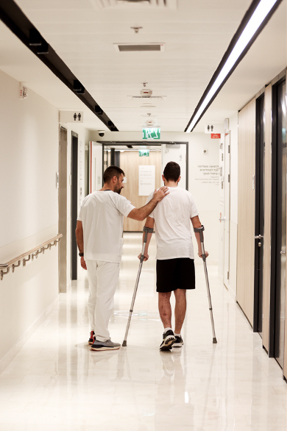Israel's Rabin Medical Center Newly Opened Rehabilitation Center Is The Future Of Healthcare

Dr. Michael Bahar, Rabin Medical Center's Director of the newly created Rehabilitation Department dedicated to war casualties, outlines how this war has changed the future of rehabilitation and post-op therapy.
"The war caught the rehabilitation wards with a shortage of about 500 beds," said Dr. Behar. "The high number of wounded put pressure and cause great difficulty on the rehabilitation experts in Israel. As of today there are 13,000 wounded civilians and soldiers, many of whom will need rehabilitation."
Rabin Medical Center responded to this urgent need by opening a new specialized rehabilitation unit specifically for war casualties, and assigned Dr. Bahar as the Director. In this position, Dr. Bahar has made it clear that this particular crisis is not resolved solely by increasing the number of beds. And this is where Rabin Medical Center's Innovation Lab, which focuses on the intersection of technology and artificial intelligence, comes in.
"It's not just about beds but also about manpower, and that's what we have to focus on," he said. "In my vision, the physiotherapist works in a world of virtual reality. One physiotherapist can treat several patients during a virtual therapy session where the patients are everywhere - in other departments or at home. This way we can treat more patients with the same personnel."
Dr. Bahar concluded with, "We have already started using artificial intelligence (AI) in the treatment of wounded soldiers, and this is to monitor the possibility of developing post-traumatic stress disorder (PTSD). We have a lot of wounded soldiers and injured people and a relatively small team to threat them. The fact that we can use an AI model to focus our treatment capabilities on those who really need it is a huge advantage.